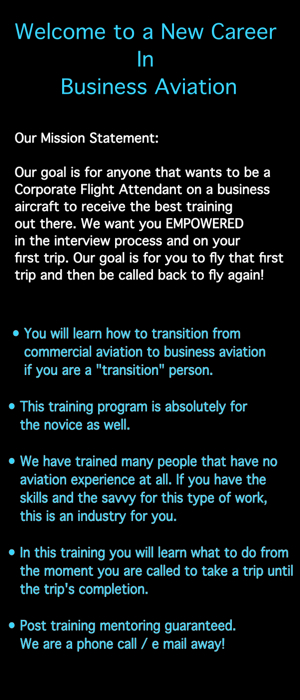Who Is The Corporate Flight Attendant?
Who is the corporate flight attendant? Simply put, the corporate flight attendant (also called a “business aviation flight attendant”) is just that, a flight attendant who works on private, non-commercial aircraft (generally referred to as “business aircraft”).
How the need for corporate flight attendants arose
The presence of business aviation came into being shortly after World War II. The end of the war made available to the civilian market a large supply of military transport aircraft and veteran pilots. As private air travel increased, so did the demand for a more business-oriented environment. This environment required interiors that would support the business person by providing total comfort and office-like amenities.
In the early days of business aviation, the trend seemed to be that aviation managers and chief pilots used flight mechanics/techs in the back of the aircraft as a third crew member. There was no emphasis on specialized or elaborate food service. As interiors became increasingly detail-oriented in order to support the client’s requirements, the need arose for a third crew member in the back of the aircraft who could expeditiously accommodate specialized requests. The galley equipment became more elaborate and extensive, as did the high-tech electronic communication and in-flight entertainment systems.
Establishment of the corporate flight attendant profession
By the end of the 1980s, it was apparent that the third crew member needed to be an emergency/first-aid, culinary, and food safety trained flight attendant. Now the passengers of business aircraft had privacy, anonymity, a safe space, and the ultimate in comfort and in-flight amenities. Business aviation provides the ability to create a non-structured time schedule that is changeable at any moment and on any whim. In our environment, there is always a degree of stressful events that go along with the position of corporate flight attendant, whether flying full-time or contract. There are always last-minute schedule changes and passenger count changes, cancellations, or extensions of the trip. Unless you are working on large and heavy corporate aircraft equipment like a BBJ, etc., which typically requires more than one corporate flight attendant onboard, you are usually alone in the back and have to work it all out alone. In these times, there is no room for mistakes and errors. It has to be done correctly.
What it takes to be a corporate flight attendant today
In the world of business aviation, nothing is ever written in stone. It is a world and environment of total flexibility. It is a very exciting and ever-changing work place. If there is any one character trait that is most important in this industry called business aviation, it is being “FLEXIBLE.” I want to emphasize that, first and foremost, safety of the passengers and the aircraft environment is paramount.
So what are the qualities that a corporate flight attendant needs to be successful? You must have impeccable organization and resolution skills. In no particular order, additional qualities are as follows:
• Flexibility
• Creativity
• Personal accountability
• Integrity
• Interpersonal skills
• No ego
• Taking direction
• Confidentiality
• Constant professionalism
• Being multi-task oriented
• Ability to compartmentalize
• Out-of-the-box thinking
• Being a contract corporate flight attendant
As for me, in all the years that I have flown, contract flying is the most difficult, challenging, and rewarding type of flying that I have ever done. On a daily basis, you find yourself interacting with the many different cultures and personalities of a corporation. You continually find yourself interfacing with the CEO, his/her corporate and personal family, the aviation manager, the chief pilot, the dispatcher/scheduler, the chief flight attendant, and the maintenance staff. Corporations, recognized by the law as “people,” have personalities as different and unique as humans.
Add the fact that, in any given month, you find yourself operating on various aircraft of different manufacture. Each aircraft has its own separate and unique features. Each plane has its own distinct set-up, different amenities, aircraft-specific emergency exits and emergency equipment, and configurations. Some of the galleys may or may not be “flight attendant friendly”. While the full-time flight attendant finds him or herself in the same environment each time he or she flies, the contract flight attendant is always acclimating and adjusting to a new work environment.
Each flight department has different standard operating procedures (SOPs) and philosophies to which you must adhere, and subtly different roles for their third crew member — the contract corporate flight attendant.
Skills needed to be a contract corporate flight attendant
In addition to those necessary skills listed above for being a successful corporate flight attendant, contract corporate flight attendants must also:
• Effectively manage their time
• Book trips, keep and maintain schedules
• Manage themselves as a business
• Interface with several flight departments
• Adapt to various flight departments’ SOPs
• Remain open-minded at all times
• Be impeccably organized
• Perform safe and creative menu planning and food execution
• Maintain their recurrent egress training annually
Contract corporate flight attendants must also strive to maintain the new philosophy used in the flight departments of many Fortune 500 companies, also known as the Standards of Excellence in Business Aviation (SEBA). In addition, they must never lose sight of the fact that they are “a paid guest on someone else’s aircraft.” Last, it is useful to keep in mind these rules of thumb:
You are routinely challenged in a career that has absolutely no routine.
PERCEPTION IS REALITY!
Never Assume..........
The moment you assume.. you go into RECOVERY!
Not easy at 41,000 feet!!!!!
BETTER BUSINESS BUREAU
215.625.4811
215.413.9013 fax

